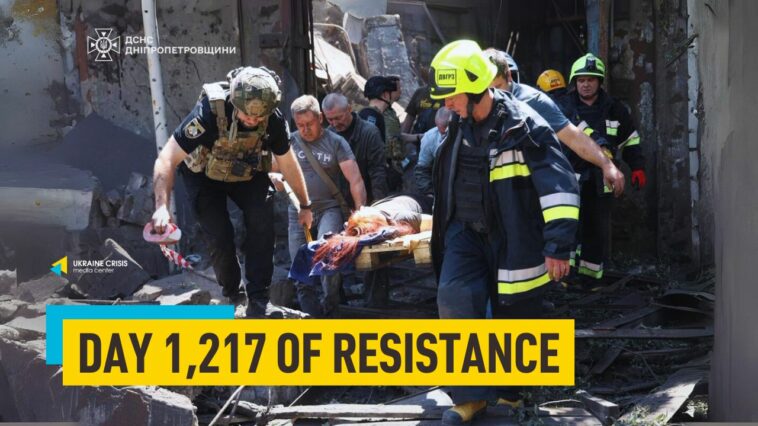A Russian missile attack on Dnipro kills at least 17, leaves wide destruction. Hungary and Slovakia block a Russian sanctions package ahead of EU leaders’ summit. Russian attacks on Sumy that use Grad unguided artillery systems must be investigated as war crimes, Amnesty International says.
Russian missile attack on Dnipro kills at least 17, leaves wide destruction
A Russian missile attack on the city of Dnipro on Tuesday morning killed at least 17 people and wounded 279 others, including 27 children.
At least 12 people staying in hospital after the attack were in critical condition, head of the regional military administration, Serhiy Lysak said on Tuesday evening. “The medics are doing everything possible. The number of casualties is being updated. Unfortunately, the number of peopled affected by the attack is constantly growing. The toll could have been much higher. Many of those in the impact area were sheltering at the moment of the attack. It saved dozens of lives,” Lysak said in a post to Telegram.
The strike damaged 46 apartment buildings, 41 private homes, dormitories, administrative buildings, medical and educational facilities, outbuildings, shops, more than 100 cars and a passenger train, the authorities said.
Two people were killed in the city of Samar in the region of Dnipro in that same attack on Tuesday. Nine others were wounded, most of them were taken to hospital. An infrastructure facility in Samar sustained damage.
Hungary, Slovakia block Russian sanctions package ahead of EU leaders’ summit
Hungary and Slovakia opposed EU’s new package of sanctions against Russia, saying they wanted to wait until a European Council meeting of EU leaders at the end of the week, Ukrainian news site European Pravda said on Tuesday, citing two EU diplomats familiar with the matter who spoke on condition of anonymity.
On Monday, the European Commission presented its proposals for an 18th package of sanctions that include suggestions to lower a price cap on Russian oil, one of the diplomats said.
Some delegations wanted to remove the proposal from the package due to rising oil prices, while others claimed willing to keep it. Still, the diplomat said they were close to making a deal.
He expressed optimism that the text can be agreed and presented for approval at a Coreper [Committee of the Permanent Representatives of EU member states] session on Friday.
Earlier reports said that the EU was not prepared to lower the price cap on Russian oil to USD 45 per barrel from the current USD 60 without the G7 moving in lockstep.
Hungary and Slovakia have decided not to support the EU’s plan for an 18th sanctions package against Russia, Hungarian Foreign Minister Péter Szijjártó said on Monday in a press briefing.
Russian attacks on Sumy that use Grad unguided artillery systems must be investigated as war crimes, Amnesty International says
Civilian residents of the northeastern city of Sumy are being targeted by Russian attacks more and more frequently as Russia intensifies its strikes on the region, Amnesty International said on Tuesday. Russian attacks that use Grad unguided multiple launch rocket systems must be investigated as war crimes, the organization stated. The paragraphs below are quoted from the report.
In Sumy city earlier this month, Russian forces fired unguided 122-mm Grad rockets from a multiple rocket launch system, killing at least seven civilians and injuring dozens more. These unguided munitions are inherently inaccurate and have wide area effects, and should therefore never be used in populated areas with civilians.
Sumy city centre, approximately 40 kilometres from the border with Russia, is home to an estimated 200,000 people, the vast majority civilians who have continued living there during Russia’s war of aggression. In recent weeks, Russia has captured several settlements in the region. The Russian military now appears to be within artillery range of Sumy city as they attempt to capture further territory.
“Our research has shown how Grad rockets have caused death and destruction across a wide area of Sumy city. These indiscriminate attacks must be investigated as war crimes,” said Brian Castner, Amnesty International’s Head of Crisis Research.
“Russia’s continuing war of aggression has wreaked havoc on civilian life in Ukraine. Inherently inaccurate weapons must not be fired at areas densely populated with civilians. As the Russian military appears to be increasing attacks on Sumy and elsewhere across Ukraine, we again call for international humanitarian law to be respected. Civilians are not targets,” he continued.
Amnesty International said it had conducted remote interviews with nine people who witnessed strikes in Sumy on 3 June 2025. It also analyzed dozens of photos, videos and social media posts, including footage from the immediate aftermath of the strikes and photos of weapons fragments that confirmed the use of 122mm Grad rockets. Amnesty International said it had visited five out of a reported seven impact locations to verify when and where a strike occurred.
According to recent data from the UN’s Office of the High Commissioner for Human Rights, casualties from Russian attacks have increased significantly in Ukraine in recent months, particularly in regions closer to the front lines. According to Ukrainian authorities, the Russian military is carrying out between 80 to 120 attacks in Sumy Oblast per day.




